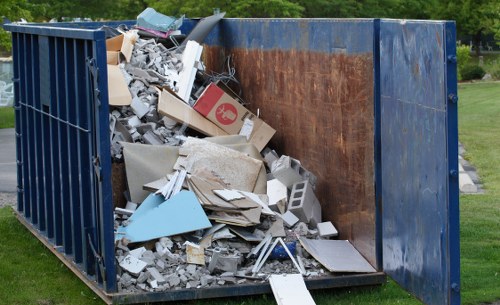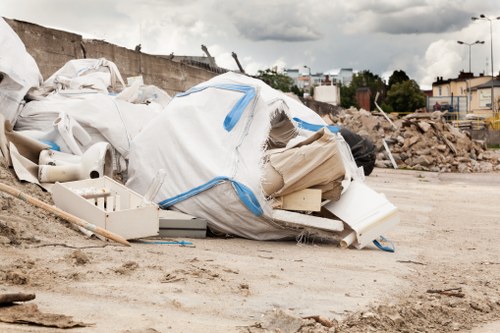Construction Waste Disposal in Tufnell Park
Understanding Construction Waste

Construction projects inevitably generate a significant amount of waste, ranging from small debris to large materials that need proper disposal. In Tufnell Park, managing this construction waste effectively is crucial for maintaining the area's aesthetic appeal and environmental health.
Construction waste disposal encompasses the processes involved in handling, transporting, recycling, and disposing of materials generated during construction activities. Proper disposal not only ensures compliance with local regulations but also contributes to sustainable building practices.
Types of construction waste can vary widely, including concrete, wood, metals, bricks, and plastics. Each material poses unique challenges in terms of disposal and recycling, necessitating tailored approaches to manage them efficiently.
Types of Construction Waste

Understanding the different types of construction waste is fundamental to developing effective disposal strategies. Common categories include:
- Concrete and Masonry: These materials are heavy and require specialized recycling processes.
- Wood: Salvageable wood can often be repurposed or recycled, reducing the need for new raw materials.
- Metals: Metals like steel and aluminum can be recycled multiple times without losing quality.
- Plastics: Various plastics used in construction can be challenging to recycle due to contamination.
- Drywall: Often disposed of in landfills, though some recycling options are emerging.
By categorizing waste effectively, construction companies can implement more sustainable practices and minimize their environmental footprint.
Importance of Proper Disposal

Proper disposal of construction waste is not just a regulatory requirement but also a responsibility towards the community and the environment. In Tufnell Park, efficient waste management helps:
- Reduce Environmental Impact: Minimizing landfill use and promoting recycling helps conserve natural resources.
- Enhance Site Safety: Properly managed waste reduces hazards on construction sites.
- Improve Aesthetics: Keeping waste off the streets maintains the neighborhood's visual appeal.
- Comply with Regulations: Adhering to local waste disposal laws prevents legal issues and fines.
Ultimately, effective construction waste disposal supports the sustainability and livability of Tufnell Park.
Regulations Governing Waste Disposal in Tufnell Park

Compliance with local regulations is essential for construction waste disposal in Tufnell Park. The area follows stringent guidelines set by the London Borough of Camden, which include:
- Waste Classification: Differentiating between hazardous and non-hazardous materials.
- Permits and Licensing: Required for waste transport and disposal facilities.
- Recycling Targets: Mandates on the percentage of waste that must be recycled or reused.
- Disposal Protocols: Specific methods for disposing of different types of waste.
Staying informed about these regulations ensures that construction projects in Tufnell Park operate smoothly and responsibly.
Local Regulations

The London Borough of Camden enforces regulations that aim to reduce the environmental impact of construction activities. Key aspects include:
Waste Prevention: Encouraging practices that minimize waste generation from the outset.
Mandatory Recycling: Requiring construction firms to recycle a significant portion of their waste.
Reporting and Documentation: Maintaining detailed records of waste management processes for accountability.
Environmental Standards
Adhering to environmental standards is crucial for sustainable construction waste disposal. These standards ensure that:
- Pollution is Minimized: Preventing contaminants from entering soil and water systems.
- Resource Efficiency is Maximized: Promoting the reuse and recycling of materials to conserve resources.
- Wildlife and Natural Habitats are Protected: Reducing the ecological footprint of construction activities.
By meeting these environmental standards, construction projects contribute to the long-term health and sustainability of Tufnell Park.
Methods of Construction Waste Disposal

Effective construction waste disposal in Tufnell Park involves a combination of methods tailored to the specific types of waste generated. The primary methods include:
- Recycling and Reuse: Salvaging materials for future use reduces the need for new resources.
- Landfilling: Disposing of non-recyclable waste in designated landfills.
- Incineration: Burning waste to reduce its volume and sometimes generate energy.
- Composting: Organic materials can be composted to create valuable soil amendments.
Each method has its benefits and challenges, and often a combination is used to achieve optimal waste management.
Recycling and Reuse

Recycling and reusing construction waste is the most sustainable approach. It involves processing used materials to make them suitable for new construction projects. Benefits include:
- Resource Conservation: Reduces the demand for raw materials.
- Cost Savings: Lower disposal costs and potential revenue from selling recycled materials.
- Environmental Protection: Decreases landfill usage and pollution.
In Tufnell Park, numerous facilities specialize in recycling construction waste, making it easier for builders to adopt these practices.
Landfilling

Landfilling is a common method of disposing of construction waste that cannot be recycled or reused. While it is a straightforward solution, it has significant drawbacks:
- Environmental Impact: Landfills can lead to soil and water contamination if not managed properly.
- Space Constraints: Limited landfill space necessitates finding alternative disposal methods.
- Long-Term Costs: Maintaining landfill sites can be expensive over time.
Therefore, while landfilling remains essential, it should be minimized through effective waste reduction strategies.
Incineration

Incineration involves burning construction waste at high temperatures, reducing its volume and sometimes generating energy. Advantages include:
- Volume Reduction: Significantly decreases the amount of waste needing disposal.
- Energy Recovery: Some incineration facilities can convert waste into usable energy.
However, incineration must be carefully managed to avoid air pollution and other environmental issues, making it less favorable compared to recycling and reuse.
Composting

Composting is an eco-friendly method suitable for organic construction waste, such as wood scraps and certain types of insulation. Benefits include:
- Soil Enhancement: Compost can be used to improve soil quality in landscaping projects.
- Waste Reduction: Minimizes the amount of waste sent to landfills.
Implementing composting practices contributes to a circular economy, where waste is continually repurposed.
Choosing the Right Disposal Service

Selecting an appropriate construction waste disposal service in Tufnell Park is vital for efficient and compliant waste management. Key factors to consider include:
- Service Range: Ensuring the provider handles all types of construction waste your project generates.
- Recycling Capabilities: Preference for services that prioritize recycling and reuse.
- Cost-Effectiveness: Competitive pricing without compromising on service quality.
- Compliance: Verifying that the service adheres to local regulations and environmental standards.
By evaluating these factors, construction firms can partner with reliable disposal services that meet their specific needs.
Factors to Consider

When choosing a waste disposal service, consider the following:
- Reputation and Reviews: Look for services with positive feedback and a proven track record.
- Flexibility: Ability to handle varying volumes of waste, especially during peak construction phases.
- Environmental Credentials: Certifications or memberships indicating a commitment to sustainable practices.
- Customer Support: Responsive and helpful support to address any issues promptly.
These considerations ensure a smooth and effective waste disposal process.
Top Disposal Services in Tufnell Park

Tufnell Park is home to several reputable construction waste disposal services known for their reliability and sustainability. Some of the top providers include:
- EcoWaste Solutions: Specializes in comprehensive recycling services for all types of construction waste.
- GreenBin Disposal: Offers competitive rates and flexible schedules for waste collection.
- Camden Waste Management: Known for adherence to environmental standards and excellent customer service.
Partnering with these services can significantly enhance your waste management strategy.
Benefits of Proper Construction Waste Disposal

Implementing effective construction waste disposal practices in Tufnell Park yields numerous benefits:
- Environmental Impact: Reduces pollution and conserves natural resources through recycling and reuse.
- Economic Benefits: Lower disposal costs and potential revenue from selling recyclable materials.
- Compliance: Ensures adherence to local regulations, avoiding fines and legal issues.
These advantages underscore the importance of prioritizing waste management in construction projects.
Environmental Impact

Proper waste disposal minimizes the negative environmental impacts associated with construction activities. Key aspects include:
- Resource Conservation: Recycling materials reduces the need for extracting new resources.
- Pollution Prevention: Proper handling of waste prevents contaminants from entering ecosystems.
- Carbon Footprint Reduction: Efficient waste management can lower greenhouse gas emissions.
These measures contribute to a healthier and more sustainable environment in Tufnell Park.
Economic Benefits
Effective construction waste disposal also offers significant economic advantages:
- Cost Savings: Reducing waste minimizes disposal fees and lowers overall project costs.
- Revenue Generation: Selling recyclable materials can create additional income streams.
- Job Creation: Recycling and waste management industries generate employment opportunities.
These economic benefits make sustainable waste disposal an attractive option for construction firms.
Compliance and Avoiding Fines

Adhering to local waste disposal regulations in Tufnell Park is essential to avoid penalties and ensure project success. Key points include:
- Regulatory Adherence: Following guidelines set by the London Borough of Camden.
- Documentation: Keeping accurate records of waste management practices.
- Regular Audits: Conducting inspections to ensure ongoing compliance.
By maintaining compliance, construction projects can avoid costly fines and ensure smooth operations.
Challenges in Construction Waste Disposal

Despite the benefits, managing construction waste can present several challenges:
- Volume of Waste: Large projects generate substantial amounts of waste, complicating management efforts.
- Material Diversity: Handling various types of waste requires diverse disposal methods.
- Logistical Issues: Coordinating waste collection and transportation can be complex.
Addressing these challenges requires strategic planning and effective waste management practices.
Common Obstacles

Several common obstacles can hinder effective construction waste disposal in Tufnell Park:
- Lack of Awareness: Limited knowledge about recycling options and disposal regulations.
- Insufficient Infrastructure: Inadequate facilities for recycling and waste processing.
- High Disposal Costs: Expenses associated with waste management can deter proper practices.
Overcoming these obstacles is essential for achieving sustainable waste management goals.
Solutions and Best Practices

Implementing solutions and best practices can mitigate challenges in construction waste disposal:
- Education and Training: Providing workers with knowledge about waste management.
- Investing in Technology: Utilizing advanced tools for efficient waste sorting and processing.
- Collaborating with Experts: Partnering with reputable waste disposal services.
Adopting these strategies promotes effective and sustainable waste management.
Future Trends in Waste Disposal

The landscape of construction waste disposal is evolving, with several trends shaping its future:
- Sustainable Practices: Increasing focus on reducing waste generation and enhancing recycling.
- Technological Innovations: Adoption of new technologies for waste sorting, processing, and tracking.
- Circular Economy Models: Emphasizing the reuse and repurposing of materials to create closed-loop systems.
Staying abreast of these trends ensures that waste management practices remain effective and environmentally responsible.
Sustainable Practices

Sustainability is at the forefront of modern construction waste disposal. Key practices include:
- Waste Minimization: Designing projects to produce less waste.
- Material Efficiency: Selecting materials that are easier to recycle and have a lower environmental impact.
- Green Building Certifications: Adhering to standards like LEED to promote sustainable construction.
Implementing sustainable practices contributes to long-term environmental and economic benefits.
Technological Innovations

Advancements in technology are revolutionizing construction waste disposal:
- Automated Sorting Systems: Enhancing the efficiency and accuracy of waste separation.
- Waste Tracking Software: Allowing for better monitoring and management of waste streams.
- Advanced Recycling Techniques: Enabling the processing of previously non-recyclable materials.
These innovations improve the effectiveness of waste management, making it more sustainable and cost-efficient.
Contact Us Today

Effective construction waste disposal in Tufnell Park is essential for sustainable and compliant building practices. Whether you're embarking on a new construction project or managing an existing one, partnering with the right disposal service can make all the difference.
Don't let waste management challenges hinder your project success. Contact us today to learn how our expert services can streamline your waste disposal processes, ensuring efficiency, compliance, and environmental stewardship.
Take the next step towards sustainable construction practices by reaching out to our dedicated team.